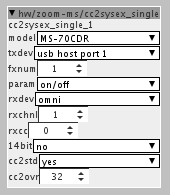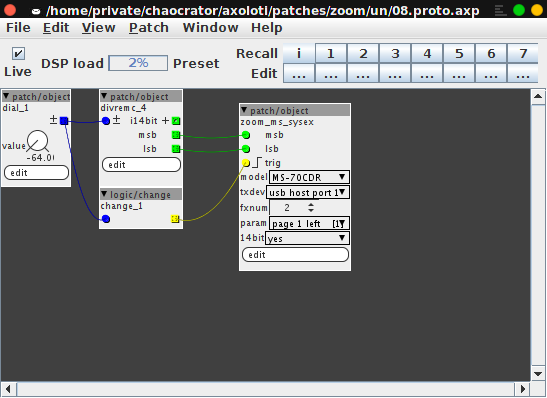objects for controlling Zoom MultiStomp pedals (MS-50G, MS-60B, MS-70CDR) via MIDI.
there are two versions of objects — one takes takes MIDI CC messages and converts them to model-specific SysEx, another takes parameter value(s) from inlets and sends them to pedal as SysEx messages.
Zoom MS pedals are always on USB host port 1 when attached directly to Axoloti. if you change the port to something else, pedal won't respond.
1) this object controls a single parameter of Zoom MultiStomp pedal via MIDI.
cc2sysex_single.axo (7.7 KB)

parameters for outgoing messages:
model – MS-70CDR / MS-60B / MS-50G;
txdev – port to transmit SysEx messages to (you likely want to send them directly to pedal attached to USB host, but there are also other options);
fxnum – effect number (can be 1–6, but only first 3 effects in chain actually react to SysEx messages);
param – effect parameter to control;
parameters for incoming messages:
rxdev – port to receive incoming CC messages on;
rxchnl – MIDI channel for incoming CC messages;
rxcc – incoming CC message number.
that's all for parameters with values no more than 127 (7-bit resolution); if parameter range is beyond 0–127, then 14-bit resolution is required, and the folowing object parameters are related to this:
14bit – no/yes (default is "no");
cc2std (yes/no) – whether the number of second CC message for 14-bit value follows the standard convention (1st CC message number + 32); you likely want it to be "yes" unless you really know what you're doing;
cc2ovr – the non-standard second CC number (relevant only if the previous parameter is "no").


